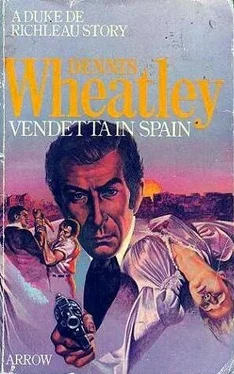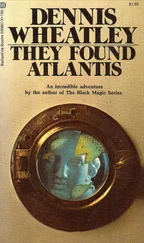lady said tartly, There is nothing to smile at in this, Gulia. To weep for the poor Count would be more fitting.'
Instantly the smile on Gulia's full red lips disappeared, and with a surprised lift of her fine eyebrows she replied, 'Did I appear to be smiling, Dona Ines? I certainly was not. It must have been the shadow thrown on my face by those flowers between us and the lamp standard that deceived you. No one could be more upset by this tragedy than myself.'
But she was lying. She had neither particularly liked nor disliked Angela as a person, and, as she was not an evil woman, she would not have wished her dead. But she was an intensely passionate one and, quite unconsciously, de Quesnoy had aroused in her an emotion that went to the roots of her being.
She had been thinking, Tt was because of his devotion to his wife that he would not even look at me. And now she is dead . . . dead. It will take him time to get over it, but when he has I'll make him look at me with seeing eyes. He'll become my lover then. What bliss that would be. For that I'll risk anything - even Jose's learning about us and throwing me out into the street.'
2
The Aftermath
The state of mute despair in which Frangois de Vendome had found de Quesnoy had certainly given the young man grounds to fear for his friend's reason, but, in fact, the Count was much too well-balanced for even so terrible a shock to affect him permanently. Nevertheless it was not until several days after Angela's funeral that his manner again became anything approaching normal.
During them he spent most of his time in a small sitting-room that de Cordoba had offered him as a sanctum; and, in order not to depress the other guests, had asked to have his meals served there. De Vendome had brought Father Tomaso, the Cordobas' chaplain, to see him and urge upon him the consolations of religion, but he had politely declined them on the grounds that, although nominally a Catholic, he had long since ceased to be a practising one. However, Angela had become a convert to the Roman faith before her first Carriage, so he willingly accepted the good Father's offer to make arrangements for her burial.
21
The bomb had killed thirty people and wounded over a hundred. On the afternoon of his wedding the King had visited the injured in hospital and he had then ordered that a State funeral should be given to the dead. The majority were conveyed to the cemetery on nine enormous hearses through weeping crowds, but a few of the bereaved families preferred to arrange private interments, among them that of the Marquesa de Tolosa. She had been seated on the second floor balcony of the house from which the bomb had been thrown and, as her family were friends of the Cordobas, Father Tomaso arranged that a Requiem Mass should be celebrated for the Marquesa and Angela together.
While de Quesnoy remained mainly in seclusion he found his greatest solace in his host, who devoted much time to sitting with him. The backgrounds of the two men could hardly have been less similar. De Quesnoy's had been an open-air life of travel, soldiering, war and sport, whereas the Conde had never been outside Europe, neither hunted, fished nor shot, and spent most of his time immersed in his banking activities, his only outdoor interest being as a naturalist with the finest collection of butterflies in the country. Yet they had certain things in common. Both of them came from ancient families and were passionately convinced Monarchists; both were well read and particularly interested in history and ancient religions; and both had a wide knowledge of international relations. So, after a day or two, by coaxing de Quesnoy to discuss these subjects, the Conde found that for a while he could take his guest's mind off his bereavement.
At the end of the week's wedding celebrations the Cordobas' other guests left for their homes and de Quesnoy raised the matter of his own departure; but, as he had not been able to bring himself to make any plans, the Conde insisted that he should stay on, at least for another week or two, and he gladly accepted.
It was no small part of his affliction that with the loss of Angela he had become completely rootless. When writing to break the news of her death to her parents he had also written to his agents instructing them to break off negotiations for the house near Berkeley Square as, now that he had become a widower, it would have been much too large for him. Moreover, although his relations with her family were pleasant enough and he knew they would willingly continue to accept him as a member of it, he found most of them distinctly dull, and without her to make it tolerable he felt most averse to condemning himself to the pointless social life they led.
Thirteen years had elapsed since he had left his boyhood home in Russia, and during them he had been back there only once. It lay in the heart of Central Europe, on the River Pruth near the little town of Jvanets and the best part of 400 miles from the nearest cities: Kiev, Budapest, Bucharest and Odessa; so the only diversion it could offer was hunting. He knew that his father would be pleased to see him, so he might go there for a visit of a month or two, but to settle down there with only the affairs of the estate to occupy him would soon bore him to distraction.
Vienna was the city that he loved best, and he could be sure of a welcome there from many old friends with whom in the past he had painted the town red. But at* this juncture the thought of nights spent with Wine, Women and Song appealed to him even less than the more staid social life of London. There remained the possibility of reviving his plan for offering his services as a soldier to one of the South American Republics; but as yet he still felt quite incapable of making any definite decision about his future.
Apart from an intolerable ache caused by the finality of his loss of Angela, only one emotion stirred him repeatedly; it was a fierce craving to see justice done on those responsible for her death. Daily he spoke of this to the Conde, who kept him informed about the progress the police were making in their investigations.
The name of the assassin was Mateo Morral and he was on the police files as an agitator, but had done nothing before throwing the bomb which might have justified his arrest. He had come from Barcelona and was a Catalan of superior type; his bearded face had a mild expression, his hands were well cared-for and he had a general air of middle-class respectability.
The old house from which the bomb had been thrown had been divided up into apartments, and it was Morral's unsuspicious appearance which had enabled him to rent a room on its third floor without anyone suspecting that he might be an anarchist. But when the room had been broken into, it had been found that, in addition to chemicals left over from compounding the explosives for the bomb, there were others that indicated he had been treating himself for syphilis.
Immediately he had thrown the bomb he had rushed downstairs, mingled with the crowd in the street, and succeeded in reaching the office of a Don Jos6 Nakens, who was the editor-proprietor of a Republican weekly journal called The Mutiny . Nakens had provided him with a change of clothes and found him shelter for the night. Ke had then managed to escape unrecognized from the city and gone into temporary hiding with another associate at a village on the road to the Escorial. Next day he attempted to board a train at Torrejon de Ardoz, but by then his description had been circulated throughout the length and breadth of Spain, and at the station he was identified. A rural guard who was present had tried to arrest him but Morral had shot him dead with a Browning pistol, and had then used the pistol to kill himself.
Further investigations disclosed that had the anarchists' original plot matured it would have had infinitely more hideous results. A gallery in the church in which the wedding Mass was to be celebrated had been allotted to the Press. With forged credentials Morral had succeeded in obtaining a pass to it and had intended to throw his bomb down into the body of the church at the moment when the King and Queen received the Sacrament. Had he done so the two hundred fragments into which it splintered must have killed not only them but half-a-hundred other royalties, priests and officials grouped about the high altar.
Читать дальше












